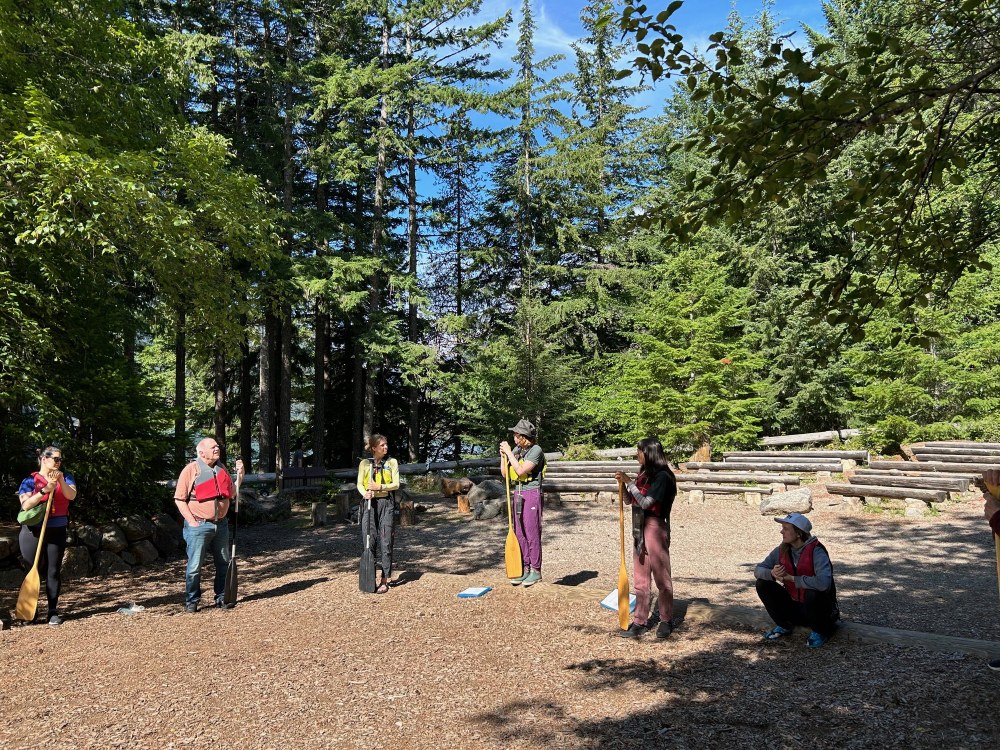
Mountaineers staff and volunteers have been aware of gaps in our member and leadership training related to emotional safety for a number of years. Between 2020 and 2024, staff-sponsored Leadership Development Series hosted a number of evening seminars that touched on this topic. In 2023, staff in partnership with the Equity & Inclusion Committee introduced the Emotional Safety in the Outdoors eLearning course that connects the core values of The Mountaineers to these five themes:
- Feeling welcome and belonging within experiences
- Building trust within a group
- Supporting clear communication
- Honoring the wisdom of the group
- Deepening connection to place
This course provides valuable training, and our hope is that it will be a requirement for leaders in the near future. Additionally, many of the topics discussed in the course are strengthened when partnered with discussion with one's peers.
Many workshop participants have also been tracking the work done by the Sexual Harassment and Sexual Assault Prevention committee and wanted to see more grassroots change and action alongside the board committee work, which focuses on organization-wide, strategic improvements. Members also noted that the SHSA prevention committee is focused on improving protocols for a small set of behavior complaints when larger opportunities for improved safety and belonging exist.
June Workshop Recap
In June, a group of 20 members from Seattle and Foothills branches met to discuss emotional safety at The Mountaineers. The workshop was designed to be an opportunity for Mountaineers volunteers to come together to discuss our shared vision for improved emotional safety at the organization and actions we can collectively take together. The workshop attendees spent time at the beginning doing a visioning exercise to walk through what prioritizing emotional safety at The Mountaineers could look like. With increased emotional safety The Mountaineers would have:
- More bystanders speaking up.
- More queer people, more people of color, and more women in membership and leadership.
- Quicker accountability (if and when) a leader messes up, and in a codified way.
- Less competition.
- Increased recognition and acknowledgement of members who play a supportive role, not just those who are most technically proficient.
- A place that honors a restorative justice mindset.
- Emotionally and socially safe environments for meetings and outings where members feel they can be themselves and share their opinions and experiences.
The second part of the evening was focused on sharing best practices for supporting a culture of emotional safety. In addition to sharing best practices folks raised their hands to commit to taking actions on trips they lead and/or in their committees towards improved emotional safety.
Below is a summary of some of the best practices and ideas for action from workshop participants.
Best Practices
Courses
- Create cross-demographic leadership teams for class field trips.
- Recognize and address power dynamics in the room.
- Share Mountaineers code of ethics at the outset of all courses.
- During course/activity intros, encourage respect for communication of boundaries.
- Do course post-mortems/after action reviews.
- Repeatedly ask for feedback from students AND instructors throughout a single day and throughout the course.
- Create more opportunities for courses specifically for women or LGBTQ or BIPOC groups.
- Partner with BIPOC or queer groups for guest speakers and lectures.
Leader Training
- Emotional safety and bystander intervention trainings offered regularly and broadly for all members (not just at the Seattle Program Center) that are required for leaders.
- Practice receiving feedback AND giving it, not only at a formal leadership course but regularly and ongoing.
- Have a dedicated volunteer/instructor/leader group for folks to discuss issues related to emotional safety.
- Provide training on anti-racism and bias (to help people understand implicit bias in group scenarios or towards certain personalities and adjust accordingly).
Policies and Procedures
- Reporting and complaint policies must be clear and widely understood
- Confidentiality in handling investigations of complaints
- Transparency on who can see incident reports AND who can see trip/course feedback
- Making applying for financial aid as a member AND as a leader for courses, conferences and professional development opportunities easier.
- Collect emotional safety data with incident reports- use data to track DEI/emotional safety progress and make adjustments
Trips
- Have a co-leader or multiple leaders on trips
- Add emotional safety language in pre-trip planning communications
- Include detailed information about expectations and trip plan in emails and on trip listings
- Model vulnerability on the trail
- Share pronouns
- Center the wisdom of the group for decision making
- Acknowledge Indigenous history
As you can see a ton of great ideas were shared!
I hope you’ll join me in sharing any actions you can commit to taking this year to increase emotional safety at The Mountaineers.
Add a comment
Log in to add comments.Great best practices!
I want to acknowledge and thank all who participated for their generosity of time and emotional energy to develop these best practices.
 Tess Wendel
Tess Wendel